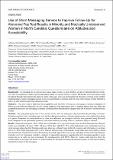Use of Short Messaging Service to Improve Follow-Up for Abnormal Pap Test Results in Minority and Medically Underserved Women in North Carolina: Questionnaire on Attitudes and Acceptability
Author
Romocki, LaHoma Smith; Marais, Andrea Des; Cofie, Leslie E.; Anderson, Chelsea; Curington, Theresa; Smith, Jennifer Susan
Abstract
Background: An estimated one in eight cervical cancer cases are due to a lack of follow-up care for abnormal Pap test results. Low rates of completion of follow-up care particularly affect low-income minority women. The burden of cervical cancer could be reduced through interventions that improve timely colposcopy follow-up and treatment of abnormal screening results. Mobile communications via text messaging present a low-cost opportunity to increase rates of clinic return among women referred to follow-up after obtaining abnormal screening results.
Objective: Our aims were to determine the acceptability and feasibility of using text messaging to increase completion of follow-up care following abnormal cervical cancer screening (Pap test) results and to examine factors that may affect the acceptability and use of text messaging to increase communications between health care providers (HCP) and low-income minority women.
Methods: The study participants were 15 low-income women who had undergone a Pap test within the preceding 12 months. Semistructured interviews, including open- and closed-ended questions from a validated questionnaire, were conducted by phone or in person. Responses to closed-ended survey items were tabulated, and descriptive statistics were generated using Microsoft Excel. Responses to the open-ended questions were coded and analyzed using NVivo 11 qualitative analysis software.
Results: Nearly all participants (14/15, 93%) were comfortable receiving a text message from an HCP stating that their Pap test results were available (<40 years: 100%; ≥40 years: 86%). Over half (8/15; 53%) of the participants were comfortable receiving a text message stating that their Pap test results were abnormal, although many preferred to receive such information via a phone call (6/15; 40%). Most participants (9/15; 60%) believed that receiving a text reminder would make them more likely to attend their appointment. The preferred method for receiving a reminder appeared to vary by age, with older women preferring telephone reminders over text messaging reminders. Analysis of open-ended questions suggested that text messaging appeals to some women due to its wide use and convenience for communicating with HCPs. However, women cited concerns about the confidentiality of messages and barriers to understanding the messages, including the physical capacity to read and accurately interpret the content of the messaging.
Conclusions: Most participants indicated a willingness to receive text messages from their HCPs about cervical cancer screening results and believed that text messages were the best way to remind them of appointments for follow-up care. Potential concerns could be addressed by excluding explicit references to the nature of the appointment in the text message in order to avoid disclosure of sensitive health information to unauthorized individuals. Although text messaging seems promising to improve adherence to timely follow-up, personal preferences should be considered by allowing patients to opt-out of text communications.
Date
2019-06-08
Citation:
APA:
Romocki, LaHoma Smith, & Marais, Andrea Des, & Cofie, Leslie E., & Anderson, Chelsea, & Curington, Theresa, & Smith, Jennifer Susan. (June 2019).
Use of Short Messaging Service to Improve Follow-Up for Abnormal Pap Test Results in Minority and Medically Underserved Women in North Carolina: Questionnaire on Attitudes and Acceptability.
,
(),
-
. Retrieved from
http://hdl.handle.net/10342/8344
MLA:
Romocki, LaHoma Smith, and Marais, Andrea Des, and Cofie, Leslie E., and Anderson, Chelsea, and Curington, Theresa, and Smith, Jennifer Susan.
"Use of Short Messaging Service to Improve Follow-Up for Abnormal Pap Test Results in Minority and Medically Underserved Women in North Carolina: Questionnaire on Attitudes and Acceptability". .
. (),
June 2019.
June 29, 2024.
http://hdl.handle.net/10342/8344.
Chicago:
Romocki, LaHoma Smith and Marais, Andrea Des and Cofie, Leslie E. and Anderson, Chelsea and Curington, Theresa and Smith, Jennifer Susan,
"Use of Short Messaging Service to Improve Follow-Up for Abnormal Pap Test Results in Minority and Medically Underserved Women in North Carolina: Questionnaire on Attitudes and Acceptability," , no.
(June 2019),
http://hdl.handle.net/10342/8344 (accessed
June 29, 2024).
AMA:
Romocki, LaHoma Smith, Marais, Andrea Des, Cofie, Leslie E., Anderson, Chelsea, Curington, Theresa, Smith, Jennifer Susan.
Use of Short Messaging Service to Improve Follow-Up for Abnormal Pap Test Results in Minority and Medically Underserved Women in North Carolina: Questionnaire on Attitudes and Acceptability. .
June 2019;
():
.
http://hdl.handle.net/10342/8344. Accessed
June 29, 2024.
Collections

